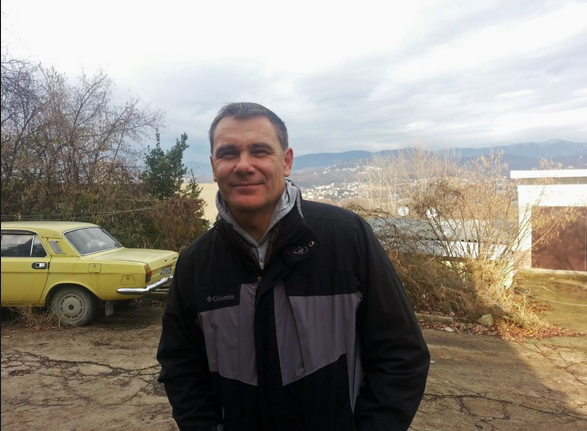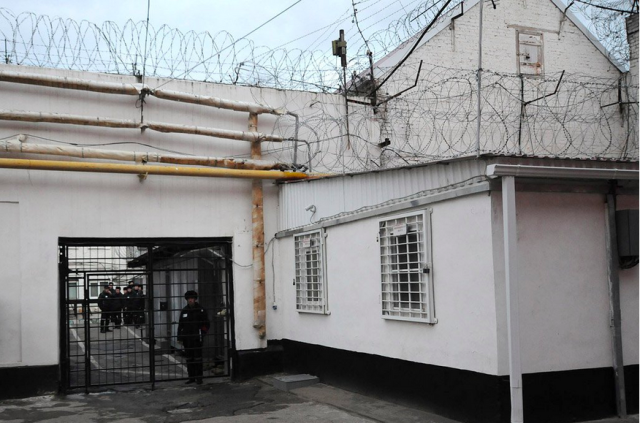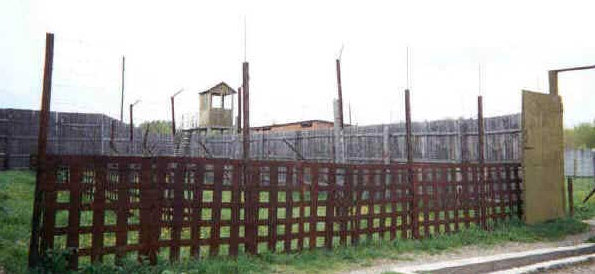
From Ukraine peace plans to Kazakh uranium—all that and more in our new nuclear digest
Our November Nuclear Digest by Bellona’s Environmental Transparency Center is out now. Here’s a quick taste of just three nuclear issues arising in U...
News

Publish date: March 13, 2014
News
The shell game prison officials are playing with Yevgeny Vitishko, the vocal environmental opponent of the Sochi Olympics, continued Wednesday as it came to light he had not been sent to the prison colony that a government-connected prisoners’ rights group had earlier indicated – marking the fourth time the activist has gone missing in his jailer’s hands.
Last Friday, Alexander Pavlikov of the Tambov Regional branch of the Public Monitoring Committee, a prisoners’ rights group affiliated with the Presidential Council for Human Rights, was told by prison officials that Vitishko had finally turned up – after being lost in transit three times – at the KP-2, or Sadovaya Settelement Colony, 45 kilometers east of the city of Tambov.
The information furnished to the prisoners’s rights group proved to be a lie.

According to Lidiya Rybina, who heads the Tambov Regional Human Rights Defense Center, and which has connections to the respected Moscow Helsinki Group, Vitishko has until this morning been at a different Tambov Regional prison colony altogether – the IK-1, a hard labor facility.
High-ranking officials at the Sadovaya settelement confirmed to Bellona that Vitishko was finally in their custody today.
Irina Grushina, of the Sadovaya Colony’s special unit and warden Vladimir Korotkevich this morning both confirmed to Bellona by telephone that Vitishko had arrived at their facility.
Korotkevich confirmed that today was the first day the facility has had custody of Vitishko, but would give no further details. Grushina told Bellona that Vitishko is now located in the Sadovaya facility’s quarantine unit, which she said is routine for all incoming prisoners. He is expected to remain there for 1o to 15 days until he is released into the colony’s general population.
But Rybina’s information that Vitishko had apparently since the last week of February been located at IK-1 came as a shock.
It indicated that prison officials had over a week ago created a fiction that Vitishko had been send to KP-2 and sold it to the Public Monitoring Committee’s Pavlikov, Andrei Rudomakha, director of the Krasnodar branch of Vitishko’s ecological group, the Environmental Watch on the North Caucasus, told Bellona.
Why keep hiding Vitishko?
Human rights activists, EWNC members and Vitishko’s lawyers are meanwhile wracking their brains about why Russia’s penal system continually lies to them about the location of a man whose alleged crime is spray-painting ecological slogans on a fence located in a protected forest in the West Caucasus nature preserve.
According to Vitishko’s Krasnodar-based lawyer, Marina Dubrovina, who last saw Vitishko in custody in Krasnodar on February 24, he had a bad cough. He also did not have any warm clothing or money for use at the settlement colony, where the weather is at the moment far colder.

Sadovaya’s Grishina said she had no information about Vitishko’s health and said she had “no idea” how long he would be located in quarantine, if he had received warmer clothing, money or been visited by a doctor.
Settlement colonies and hard labor
The different between IK-1 and KP-2 facilities is profound.
IK-1 is a hard labor camp, according to the Russia Federal Penitentiary Service’s website. It is built to house those convicted of especially violent crimes and repeat offenders, in accordance with article 129 of Russia’s penal code. Convicts are constantly under guard, sent to perform labor in regiments, and have limited contact with the outside world.

KP-2, a settlement colony, is far more relaxed. According to the Russian penal code, settlement colonies are not under guard, but rather under “observation” by the colony administration. Settlement colony inmates are allowed to move about the colony’s grounds freely, and with special permission, are even allowed to leave the grounds without supervision. Inmates are permitted to wear their own clothes, use money, and the colony’s administration is even permitted to let inmates live with relatives off colony grounds.
Alexander Popkov, Vitishko’s Sochi-based lawyer, told Bellona that it was typical for official channels to spin misinformation about high-profile political prisoners.
“They are doing this specifically to keep us off balance, keep us confused,” Popkov said. “This is nothing but a coordinated effort to keep us in the dark.”

He compared the hide and seek game for Vitishko to the long disappearance of Pussy Riot’s Nadezhda Tolokonnokova who was incommunicado for over a month during a transfer between prison colonies early last year.
Tolokonnikova and her band mate Maria Alyokhina were amnestied in December in what they both called a “cosmetic” political ploy by Vladimir Putin to clean up Russia’s human rights image before the Sochi Olympics.
Tolokonnikova and Alyokhina travelled to Sochi during the Games to draw attention to Vitishko’s unsuccessful appeal against his three-year prison colony sentence. They where horsewhipped by Cossack militiamen patrolling Sochi when they tried to perform a song in honor of Vitishko and other political prisoners.
Lost and found…and lost again
Vitishko was convicted in 2011 of spray-painting a construction fence surrounding the no-longer secret mansion of Krasnodar Regional Governor Alexander Tkachev, and given a three year suspended sentence and probation. Witnesses of the rally during which the fence was defaced have told Bellona Vitishko had nothing to do with it.
Vitishko appealed that sentence on December 21, 2013, before a court in Tuapse, his hometown, some 120 kilometers northwest of Sochi on the Black Sea coast. He received a custodial sentence in return, a move Human Rights Watch, Amnesty International and Bellona called an open effort to stifle his protest of Putin’s prized Olympics.
Vitishko appealed the verdict and was allowed to remain free until his appeal date of February 22 on the condition he not leave Tuapse without permission.
On February 3, Vitishko was picked up by police and rushed through a hearing, with no lawyer present, in which he was found guilty of swearing in public, on the evidence of two anonymous witnesses, and was immediately sentenced to 15-days administrative custody. He was due that day to travel to Sochi, with the authorities go-ahead, where he planned to speak to western journalists.
Shortly after he was locked up on the cussing accusation, his February 22 appeal date in the Krasnodar Regional court against his penal colony sentence was moved up to February 12, ensuring he would not be able to attend the hearing and speak in his own defense. Instead, he was hooked up to the Krasnodar court via a scratchy, nearly inaudible video connection from Tuapse.
His appeal was overturned after two minutes’ deliberation, and judge Andrei Konnov ordered that he serve the remainder of his public swearing sentence, and, after being turned free from the Tuapse jail, to see his family and turn himself over to penal colony authorities.
As court documents confirm, Konnov was responsible for convening a secret court that issued a decision not to allow Vitishko to return home on February 18 before going to the prison colony. Konnov also ordered that he be escorted to the prison colony under armed guard.
Vitishko was then secreted off to Krasnodar’s Remand Prison No. 1, where it took his Krasnodar-based lawyer Marina Dubrovina and Anna Mitrenko of the Krasnodar branch of the Public Monitoring Committee four days to locate him.
On February 24, it was discovered that Vitishko had again vanished without any notification of his lawyers, relatives or colleagues when EWNC’s Anna Mikhailova tried to deliver a parcel to him at the Krasnodar jail and found he was gone.
Mitrenko managed by Feb 28 to dig up information that the warden of the Krasnodar jail had sent Vitishko to a Tambov Region prison colony. It was widely assumed that was the Sadovaya Colony, and Russian penal officials confirmed he was there to the Public Monitoring Council on March 6.
“Now at least we can confirm he is where he is supposed to be,” said EWNC’s Rudomakha.
Popkov said in an earlier interview that the events surrounding Vitishko’s fourth disappearance bore out his working theory.
“It’s clear the authorities intended to push Vitishko straight from jail into the penal colony,” he said. “They didn’t want the possibility that he might speak with activists or well wishers, and they made him disappear into the system.”

Our November Nuclear Digest by Bellona’s Environmental Transparency Center is out now. Here’s a quick taste of just three nuclear issues arising in U...

For three years now, Bellona has continued its work in exile from Vilnius, sustaining and expanding its analysis despite war, repression, and the collapse of international cooperation with Russia in the environmental and nuclear fields

The Board of the Bellona Foundation has appointed former Minister of Climate and the Environment Sveinung Rotevatn as Managing Director of Bellona No...

Økokrim, Norway’s authority for investigating and prosecuting economic and environmental crime, has imposed a record fine on Equinor following a comp...